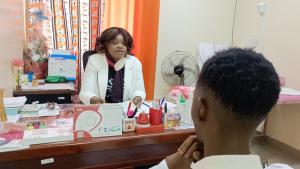Cameroon: A beacon of hope for adolescents and young people living with HIV
Yaoundé – At 14, Eugène learned he was HIV-positive. The diagnosis turned his adolescence upside down, marked by doubt, fear, and stigma. “At that age, you don’t understand everything, but you feel different. I was afraid of how others would see me, afraid of the future,” he confides. Now 20, he is a student at the Faculty of Education and advocates for self-acceptance and equitable access to reproductive health services for young people living with HIV.
Eugène’s journey reflects the challenges faced by thousands of young people in Cameroon, where the fight against HIV remains a public health priority. In 2023, the country had around 490,500 people living with HIV, including 331,000 women. Young people aged 15 to 24 accounted for nearly 19% of new infections, with 2,228 cases recorded that year—a 49% drop compared to the 4,550 new infections reported in 2019. Despite the progress, challenges are many such as stigma, limited access to family planning services, and lack of youth-friendly information for HIV-positive adolescents.
In response, the World Health Organization (WHO) plays a key role in providing technical and strategic support to the government. It assists the Ministry of Health in developing and disseminating guidelines that integrate sexual and reproductive health, family planning, and HIV care, while also supporting local NGOs working directly with young people.
The national strategy focuses on promoting and protecting the rights of adolescents and young people to access sexual and reproductive health services, including contraception. It emphasizes integrating family planning services into HIV care sites, using age-specific approaches and combination prevention. In 2024, 52.7% of young people accessed modern family planning methods, up from 44.8% in 2023—a notable improvement, though still insufficient to fully meet needs.
According to Dr Joseph Fokam, Executive Secretary of the National AIDS Control Committee, “this strategy aims to equip young people with the tools they need to make informed decisions about their sexual health in a safe and inclusive environment”. The goal is that by 2030, 90% of adolescents aged 10 to 24 will have the skills to protect themselves from HIV and STIs, while benefiting from tailored services.
Eugène, who benefits from these services, shares his experience. “My perspective on family planning has changed a lot. I’m convinced that people living with HIV must do everything to avoid transmitting the virus. That’s why having an undetectable viral load and using condoms is so important”.
Many challenges remain. Stigma and discrimination hinder access to services. Young people fear judgment when seeking contraceptives. Drug interactions between antiretroviral therapies (ARVs) and contraceptives are a concern, particularly in rural areas where access to healthcare services is limited by geographic barriers. To address these barriers, the government, with support from WHO and other technical and financial partners, including German cooperation, has since 2022 established over 187 Care, Resource, and Activity Units (USRAs) across all 10 regions, with flexible hours and trained staff. Community service points have also been created to expand service coverage, among other measures.
In this system, social workers play a key role. They are often the first point of contact for vulnerable youth, offering listening, guidance, and personalized support. Their presence helps build trust—essential for discussing sensitive topics like sexuality, contraception, or HIV.
Edwige Eyenga, a social worker at Essos Hospital Center, shares a powerful story: a 19-year-old girl, pressured by her boyfriend to have a child, came to her for advice. After an educational talk, she decided against it, continued her studies, and earned her degree. She avoided early pregnancy by practicing abstinence. Between 2020 and 2024, Ms. Eyenga supported around 200 young people. She emphasizes the need to strengthen the capacities of service providers, create youth-friendly spaces, and ensure confidentiality.
The future of the HIV response in Cameroon depends on synergy between institutional, community, and international actors. As a technical partner, WHO continues to strengthen policies, capacities, and services so that every young person living with HIV can live fully and confidently. “To be effective, services must be person-centered, respectful, confidential, and tailored to young people’s realities. This means training providers to better understand adolescents’ specific needs, reducing stigma-related barriers, and ensuring equitable access regardless of living environment. The approach must be holistic, inclusive, and sustainable,” says Dr Ngalame Alphonse Nyong, Programme Officer for Sexual, Reproductive, Maternal, Newborn, Child, Adolescent, and Elderly Health at WHO Cameroon.
Between 2017 and 2024, significant progress was made toward achieving UNAIDS’ 95-95-95 targets. Knowledge of HIV status rose from 55.6% to 92%, reflecting improved testing. Treatment access remained high, reaching 96% in 2024, while viral suppression increased from 80.1% to 93%, indicating better adherence and quality of care. These results reflect positive momentum in the fight against HIV. However, to sustain and build on these gains, services must be adapted to the needs of the population—especially young people.
Eugène, now 20, embodies this new generation of engaged youth. Thanks to the support he received, he regained confidence and can now envision a future. “I want to build a happy relationship, have children one day, and give them a future free of HIV. Today, I know it’s possible”.
Communications Officer
WHO Regional Office for Africa
Email: dialloka [at] who.int (dialloka[at]who[dot]int)
Chargée de communication
OMS Cameroun
E-mail: wegangg [at] who.int (wegangg[at]who[dot]int)
